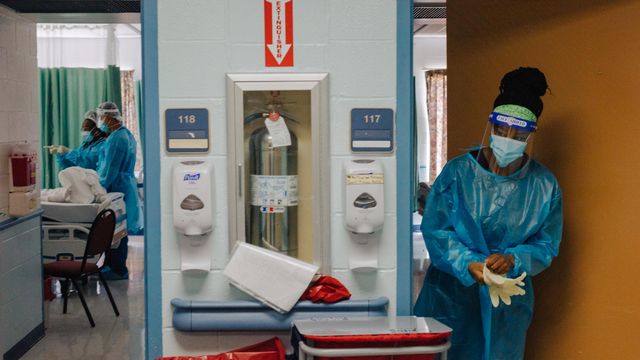Medicaid expansion would mean $500 million a month for NC, state health department says
Negotiations have slowed on Medicaid expansion, with one key lawmaker blaming hospital intransigence on regulatory reforms that Senate Republicans want to pair with the program.
Posted — UpdatedNorth Carolina would reap more than $500 million per month in federal funding if lawmakers agree to expand Medicaid in the coming months, according to the state’s Department of Health and Human Services.
Most of that money would come from boosted insurance coverage as the state adds hundreds of thousands of people to its Medicaid rolls and the federal government picks up at least 90% of the cost.
But Medicaid hasn’t been expanded. Negotiations between chambers in the state legislature stalled before the session adjourned this month.
And on Tuesday, the state Senate’s Republican leader pointed a finger Tuesday at hospitals, saying their continued opposition to a regulatory rollback that GOP senators want to pair with expansion is blocking a deal.
Hospital support is key to passage in the North Carolina House of Representatives, which would have to come on board with expansion to send a bill to Gov. Roy Cooper, who has made expansion a top priority his entire time in office.
The hospitals, however, say they’ve asked for expansion for years. North Carolina is one of a dozen states that hasn’t expanded, and Senate President Pro Tem Phil Berger and other members of the Senate Republican majority are a big reason why Medicaid hasn’t been expanded here.
“We are disappointed that expansion hasn’t been resolved and urge state legislators to get it done sooner rather than later,” North Carolina Healthcare Association spokeswoman Cynthia Charles said Tuesday. The association lobbies for hospitals across the state.
Berger, R-Rockingham, argues that if the state is going to provide health insurance for hundreds of thousands more people, North Carolina needs supply-side changes to avoid provider shortages. He paired the certificate-of-need rollback and legislation granting more authority to nurses—something many doctors oppose—with expansion in House Bill 149, which GOP senators released in late May.
Since then Berger said the Senate has offered “concrete proposals on compromises that would be acceptable, and there is absolutely no movement.”
“There remains a window to get something done,” Berger said Tuesday. “But quite frankly, as long as the hospitals remain as intransigent as they are, I don’t see that we’re going to make any progress.”
Both chambers have said the other’s bill is a non-starter.
House Speaker Tim Moore, R-Cleveland, said Tuesday that there is “some room on a few of those things [the Senate proposed],” but lawmakers should be cautious tinkering with health industry regulations.
“When hospitals come to us and say something is sustainable or not sustainable, we should listen to that very carefully,” Moore said. “[On certificate-of-need reform], I would want to see the hospitals on board with that before it’s something that we’ll pass.”
Advocates held a vigil Tuesday outside the General Assembly, begging lawmakers to act and highlighting the stories of people who died in recent years without health insurance. Rebecca Cerese, a policy advocate at the North Carolina Justice Center, held up pictures of people whose cancer was not caught until it was too late to treat.
They delayed care, she said, because they didn’t have insurance. Routine screenings might have saved their lives, she said
“These are real people’s lives,” Cerese said, tears in her eyes. “Health care can’t wait.”
Despite the apparent lack of movement over the past month, Berger retained some optimism that an expansion deal will be negotiated, though negotiations could spill into next year.
“I don’t think you can look at where we are now compared to where we were in April of this year and not feel like we’ve made progress,” Berger said. “I think there’s been a good bit of progress. I think we’ll get there. … I think we’re moving in the right direction.”
Related Topics
• Credits
Copyright 2024 by Capitol Broadcasting Company. All rights reserved. This material may not be published, broadcast, rewritten or redistributed.






